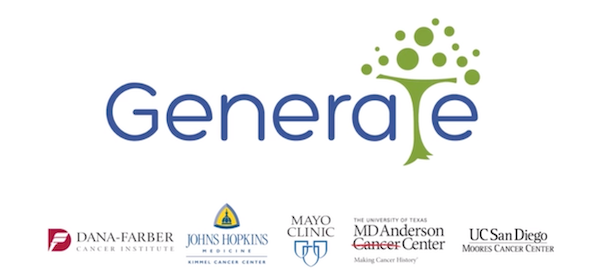News & Articles
June 2019: Latest Color Publications, Research, and News
Ben Kobren
June 2019: Latest Color Publications, Research, and News

Op-ed: Proposed patent legislation would block research, stifle innovation, and harm patients
Color CEO, Othman Laraki writes an op-ed in STAT News explaining how changes to the Patent Act recently introduced in Congress would create a chilling effect on genetics research and hurt patients.

Eurekalert Press Release
Color partners with ASHG to launch Human Genetics Scholars Initiative
On April 10th the American Society of Human Genetics announced the creation of the Human Genetics Scholars Initiative. Color, along with the National Human Genome Research Institute, have partnered with ASHG to select up to 40 US early career scientists from underrepresented backgrounds, and provide them with an intensive, two year program, as well as offer community-building and learning programs for an additional 200 young researchers from diverse backgrounds. Programs like this that enhance diversity in genetics research are essential to close the health equity gap ensuring everyone can truly benefit from cutting edge science.

Fast Company Mentioned in the News
Color Population Health named one of Fast Company’s World Changing Ideas
Each year Fast Company names the ideas they believe are changing the world. This year,Color Population Health was named to the list! Color Population Health is a data-driven healthcare platform making it easier for institutions to efficiently and effectively serve large populations.

GENERATE Research Announcement
Color collaborates with Stand Up to Cancer on GENERATE study, focused on high-risk pancreatic cancer patients
Color recently announced a collaboration with Stand Up to Cancer Scientific Research Team that includes investigators from MD Anderson, John Hopkins University, University of California, San Diego, Mayo Clinic, and other top cancer centers on the GENERATE Study. The GENERATE study aims to intercept pancreatic cancer in high-risk patients though careful early detection and targeted immune prevention. The team will test 1,000 pancreatic cancer patients for pathogenic variants and screen the immediate family members of pathogenic variant carriers for their own pancreatic cancer risk. As part of this study, Color is providing genetic testing and genetic counseling services to immediate family members of pathogenic variant carriers.

Northshore Health System Research Publication
Implementation of hereditary cancer genetic testing in the primary care setting
Historically, genetic testing for hereditary cancer has been restricted to high-risk individuals, putting potentially life-saving information out of reach for many individuals. To increase access to hereditary cancer testing and advance population health, Northshore University HealthSystem is partnering with Color to offer 10,000 patients genetic testing through their primary care physician (the largest known primary care-based genomics program in the U.S.), regardless of personal or family history. Based on an earlier pilot, 39% of patients who received information about the pilot elected to undergo genetic testing. Furthermore, 48% of patients with a positive result would not have met current recommendations for genetic testing. This suggests that health systems can proactively engage patients interested in genetic testing and further identify those with high-risk.
(Cynthia L. Neben, Anjali D. Zimmer, and Alicia Y. Zhou from Color; Peter J. Hulick, Henry M. Dunnenberger, and Kristen Yu from NorthShore University HealthSystem)

Color Research Publication
ISPOR 2019 Best Poster Winner: Participant screening behaviors and information sharing after genetic testing
The Color team compared screening behavior to recommended guidelines and assessed differences in information sharing behavior in individuals who underwent genetic testing for hereditary cancer risk through traditional and non-traditional models of testing. The research showed that genetic testing through a non-traditional model can educate about screening guidelines and spur knowledge and compliance to the same degree as a traditional model. Based on the results of the study, a non-traditional model of genetic testing is not inferior to the model of traditional genetic testing with respect to compliance with gene-specific recommendations.
Adriana Boateng-Kuffour, MS, MPH., Anjali Zimmer, Ph.D., Austin Chua, BS., Carmen Lai, MS., Lauren Ryan, MS, LCGC., Hannah Williams, MPH., Alicia Zhou, Ph.D from Color.

The FH Foundation Research Publication
A complex rearrangement in the LDLR gene in a patient with familial hypercholesterolemia and severe coronary artery disease
Familial hypercholesterolemia (FH) is a common, inherited disorder that causes high cholesterol. If left untreated, FH leads to coronary artery disease. Genetic testing for the three currently known genes that cause FH can confirm a diagnosis and be a powerful tool in the care of FH. In collaboration with The FH Foundation, Color is providing free genetic testing and counseling to individuals with FH who are participating in the PAGENT Study. At ACMG Color Variant Scientist Serra Kim presented a case study from PAGENT: a complex rearrangement in LDLR was identified by next-generation sequencing in a Caucasian individual who was diagnosed with FH following an emergency quadruple bypass surgery at the age of 32. Importantly, this variant is unlikely to have been detected by certain other sequencing methods.
Seon-Kyeong Serra Kim, Jeroen Van den Akker, Ray Chan, Stephanie Wallace, Annette Leon and Alicia Y. Zhou from Color; Dan LoDolce, Iris Kindt, Amanda Sheldon, Katherine Wilemon, Samuel S. Gidding from The FH Foundation

Color Research Publication
Polygenic risk is independent from the risk conferred by pathogenic variants in 12 known breast cancer genes
Breast cancer is the most common cancer among women, accounting for nearly 30% of newly diagnosed cancers in women in the United States during 2017. A woman’s risk for breast cancer can be estimated based on monogenic or polygenic risk. Monogenic risk is a single change in a gene associated with breast cancer, such as BRCA1 or BRCA2, and polygenic risk is many changes in many different genes. Color Data Scientist Julian Homburger investigated the relationship between monogenic and polygenic risk for breast cancer. He found that monogenic and polygenic risk are independent, meaning that they each confer their own risk and someone could have low monogenic risk and high polygenic risk or vice versa. Furthermore, the effects are additive so if someone has high monogenic and polygenic risk, the risk would be even higher.
Julian R. Homburger, Carmen Lai, Cynthia L. Neben, Alicia Y. Zhou, Gilad Mishne from Color

Color Research Publication
Phenotypic and genotypic spectrum identified in a cohort of germline TP53 carriers
Li-Fraumeni syndrome (LFS) is a rare, inherited disorder that leads to a high risk of developing certain cancers. Traditionally, genetic testing for LFS was only done in individuals meeting classic clinical criteria and involved only sequencing the one gene associated with LFS, TP53. Recently, genetic testing has moved from single-gene to multi-gene panel tests, and TP53 pathogenic variants are now being identified in individuals who do not meet the classic clinical criteria for LFS. In this poster, Color Genetic Counselor Carmelina Heydrich examines the clinical features of 34 individuals who had received multi-gene panel testing for hereditary cancer and had a TP53 pathogenic variant. She found that these individuals had a wide range of cancers and ages at onset and that approximately 50% would not have met current recommendations for TP53 genetic testing.
Carmelina Heydrich, Anjali D. Zimmer, Hannah E. Williams, Elaine Chen, Alicia Y. Zhou from Color



